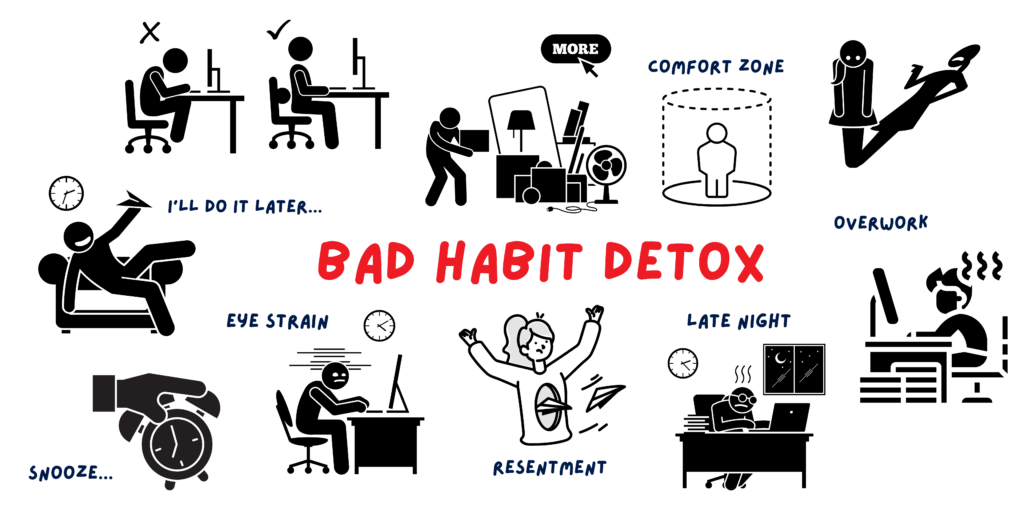9 Mistakes To Avoid When Setting Goals
Written by Michelle Ong | August 18, 2024 | Productivity

In this blog post, I cover nine common mistakes to avoid when setting goals, so you can make your goals more achievable.
Setting goals can often feel like aiming at a target blindfolded, resulting in aims lost in the daily shuffle or lingering in the realm of “someday.” Many of us struggle to pick the right goals, overwhelmed by options and guilty of losing interest quickly. This article highlights common goal-setting mistakes, helping us distinguish exceptional goals from mediocre ones and guiding us to set effective goals for personal success.
1. Don’t Resonate With Your Goals
“The point of doing work is to make ourselves happier and to make our lives more fulfilling.”
Many of us set goals but struggle to achieve them because it’s not just about making a task list—our mindset is crucial. How we perceive and approach our goals impacts our success. If you don’t believe in your goals, self-doubt can easily lead to failure.
Some of us chase goals set by others, especially at work or due to poor boundaries. It’s important to set goals that truly resonate with your needs and preferences. When your goals align with your passions and values, they become more meaningful and motivating.
Here’s what I do to set meaningful goals—focus on self-discovery. I envision who I want to be and consider my life situation, desires, and motivations. By knowing my strengths, weaknesses, values, and passions, I can set authentic goals that inspire real commitment.
For example, saying “I want to be a runner” is more meaningful to me than just “I want to exercise.” When my goals are anchored in purpose and passion, I feel a stronger connection that fuels my motivation and resilience, making the journey more fulfilling.
2. To ‘One Up’ Others
When setting goals, focus on aligning them with your abilities, resources, and life circumstances. It’s important to avoid comparing yourself to others because everyone’s journey is unique. The size of your goals doesn’t matter; what matters is their relevance to your purpose. Comparing goals to others is counterproductive since our capacities and situations differ.
I have learned that goals aren’t about competing or showing off—they’re about personal growth and achievement. I focus on pursuing objectives that resonate with my abilities and aspirations, fostering fulfillment without comparison.
3. Focused On The Outcome
Goals aren’t a magic fix for a transformed life. It’s easy to expect that they’ll bring everlasting happiness, but real change happens during the journey towards them. When you learn to value the journey, this will help in you to set goals that are realistic and focused on continuous improvement. Finding satisfaction in your progress, not just the final outcome.
Focusing only on the end result leads to frustration and anxiety. I realized the hard way that an outcome-only mindset made me miss out on the growth and learning along the way. Expecting a “happily ever after” when a goal is reached often leads to disappointment. Tying your self-worth solely to goal achievement can be devastating if you fail, leading to an endless pursuit of bigger and unrealistic goals. Maintaining balance is key.
4. Lack Clarity
I used to struggle with unfulfilled resolutions until I learned the importance of clear, effective goal-setting. I realized that to succeed, I need to be specific, realistic, and break goals into manageable steps. This approach keeps me focused and ensures progress. Clarity is key, especially when working with others, as it reduces confusion and aligns everyone’s efforts.
Here’s an example to explain what I mean:
- Clear Goal: Run 5 kilometers in under 35 minutes, three times a week.
- Ambiguous Goal: Run more often to get in better shape.
Understanding the “why” behind your goals is crucial as that gives your goals purpose, simplifies the process, and helps you in creating effective strategies and plans with clear outcomes in mind.
5. Lack Clear Timeline
When setting goals, consider the time it will take to accomplish them—whether they’re short-term or long-term, whether it can be achieved within a month or a year. Establishing a specific timeframe with deadlines and milestones is crucial.
A clear timeline helps you plan better, stay motivated, and keep your goals on track. It also adds a sense of urgency, pushing you to act consistently rather than procrastinate. To set a realistic timeframe, consider the following:
- Goal Complexity: More complex goals usually need more time.
- Measurability: I ensure my goal is measurable to track progress and set a deadline.
- Resources: I assess the time, money, and skills I’ll need.
- External Factors: I consider things like market conditions or support from others.
- Realistic Expectations: I set timelines that fit my commitments and capabilities.
6. Goal Is Too Easy
Setting goals that are both challenging and attainable is crucial for personal growth. Challenging goals push you to develop new skills, keeping you motivated and fulfilled. While easy goals may offer quick satisfaction, they can lead to complacency and prevent you from reaching your full potential.
7. Goal Is Unrealistic
While setting stretch goals is important, being realistic is just as crucial. If you’re like me and often hold yourself to high standards, it’s easy to set goals that are too ambitious, which can lead to burnout. I’ve found that being kind to myself and setting achievable goals helps maintain motivation and makes my efforts more rewarding.
I also consider the time commitment my goals demand. Are they realistic given my current schedule? Am I ready to make the necessary changes? My goals need to fit into my life without causing too much disruption.
Setting too many goals at once can be overwhelming. Instead, focus on a manageable number, knowing that your attention and focus are limited.
Tools like the Eisenhower Matrix help prioritize goals by urgency and importance, making planning more efficient. This approach allows you to set realistic expectations and better manage the time, skills, and resources needed for success.
8. Lack Sufficient Thinking & Planning
To set achievable goals, I’ve learned the value of planning each step carefully. Taking time to consider the bigger picture before planning smaller steps helps build a solid foundation for success. Rushing can kill motivation, but dragging things out does the same. So, set a reasonable timeframe for thoughtful planning and then take decision action.
9. Aiming For Perfection
Goal-setting isn’t just about writing things down. You don’t need to chase perfection or stress over setting the perfect goals from the start. The real test of a goal’s value comes when you take action. Think of it as a trial-and-error process—goals truly come to life when you start working toward them. It’s essential to infuse your goals with action to see if they’re realistic and aligned with your path.
If you are interested in learning how you can turn your goals into reality, check out this article on working intentionally towards your dream life.
Be Mindful Of The Pitfalls
“Setting goals is the first step in turning the invisible into the visible.”
Tony Robbins
Being aware of common mistakes helps lay a strong foundation for effective goal-setting. It ensures your goals are tailored to your needs and aspirations, shaping different areas of your life.
Ready to set your goals? Check out this post for practical tips on effective goal-setting. Also, explore this related article for a systematic approach to personal success.
Like what you are reading? Share this post with your family and friends!


